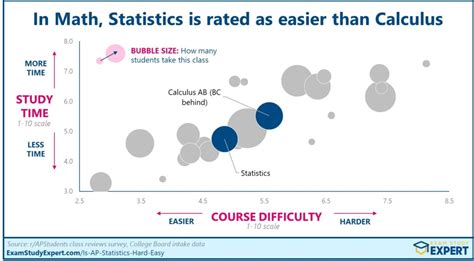The question of whether AP Statistics is easy or not is a common one among high school students. The answer, however, is not a simple yes or no. The difficulty of AP Statistics depends on a variety of factors, including the student’s mathematical background, their aptitude for statistics, and the amount of effort they are willing to put in.

Factors that Affect the Difficulty of AP Statistics
- Mathematical background: Students who have a strong foundation in algebra and trigonometry will find AP Statistics to be easier than those who do not. This is because AP Statistics builds on many of the concepts that are taught in these courses.
- Aptitude for statistics: Some students have a natural aptitude for statistics, while others find it more difficult. This aptitude can be influenced by a number of factors, including the student’s ability to think logically and their ability to understand abstract concepts.
- Effort: The amount of effort that a student is willing to put in will also affect the difficulty of AP Statistics. Students who are willing to spend time studying the material and practicing the problems will find the course to be much easier than those who do not.
Common Mistakes to Avoid
There are a number of common mistakes that students make when taking AP Statistics. These mistakes can make the course more difficult than it needs to be. Some of the most common mistakes include:
- Not understanding the concepts: Students who do not understand the concepts that are being taught in AP Statistics will find it difficult to succeed in the course. It is important to make sure that you understand the basics of statistics before moving on to more advanced topics.
- Not practicing the problems: Practice is essential for success in AP Statistics. Students who do not practice the problems will find it difficult to apply the concepts that they have learned. It is important to set aside time each week to practice the problems from your textbook and from other sources.
- Getting behind: AP Statistics is a fast-paced course. It is important to keep up with the material as it is being taught. If you get behind, it will be difficult to catch up. Make sure that you attend all of your classes and that you complete all of your assignments on time.
How to Make AP Statistics Easier
There are a number of things that you can do to make AP Statistics easier. These tips include:
- Get a good foundation in algebra and trigonometry: Students who have a strong foundation in algebra and trigonometry will find AP Statistics to be much easier. If you need to brush up on these subjects, there are a number of resources available online and at your local library.
- Practice the problems: Practice is essential for success in AP Statistics. Students who practice the problems will find it much easier to apply the concepts that they have learned. It is important to set aside time each week to practice the problems from your textbook and from other sources.
- Get help when you need it: If you are struggling with AP Statistics, don’t be afraid to get help. Your teacher is a valuable resource, and they can help you understand the concepts that you are struggling with. You can also get help from your classmates or from a tutor.
- Stay organized: AP Statistics is a lot of information to keep track of. It is important to stay organized so that you can find the information that you need when you need it. Use a notebook to keep track of your notes, assignments, and practice problems.
- Take breaks: AP Statistics can be a lot of work. It is important to take breaks throughout the semester so that you can avoid burnout. Make sure that you get enough sleep and that you take some time for yourself each day to relax.
Why AP Statistics Matters
AP Statistics is a valuable course that can help you prepare for college and for your career. AP Statistics teaches you how to think critically about data and how to use statistics to make informed decisions. These skills are essential for success in a variety of fields, including business, medicine, and law.
Benefits of Taking AP Statistics
There are a number of benefits to taking AP Statistics. These benefits include:
- Improved critical thinking skills: AP Statistics teaches you how to think critically about data and how to use statistics to make informed decisions. These skills are essential for success in college and in your career.
- Increased college readiness: AP Statistics is a challenging course that will help you prepare for the rigors of college. Students who take AP Statistics are more likely to succeed in college math and science courses.
- Enhanced career opportunities: AP Statistics is a valuable course for students who are interested in pursuing a career in a field that uses statistics. Students who take AP Statistics are more likely to be hired for jobs that require statistical skills.
Conclusion
The difficulty of AP Statistics depends on a variety of factors, including the student’s mathematical background, their aptitude for statistics, and the amount of effort they are willing to put in. However, by following the tips in this article, you can make AP Statistics easier and more enjoyable.
